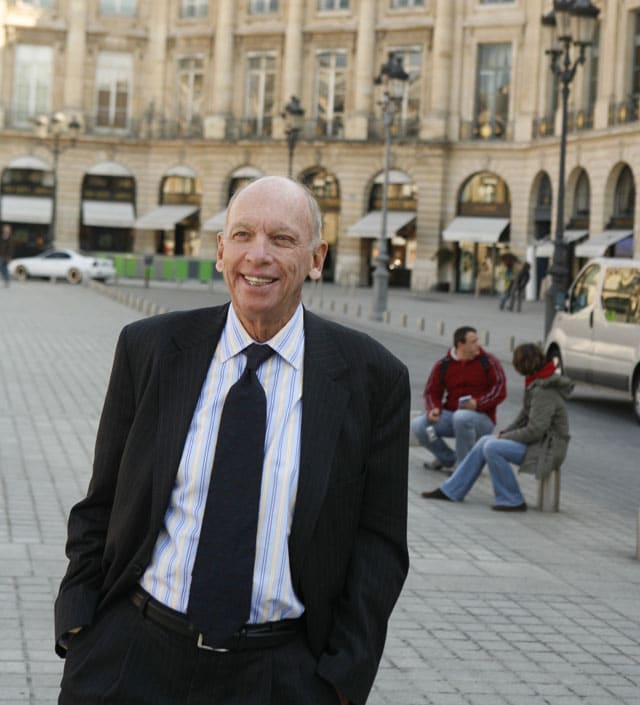At age 80, Byron Wien compiled “20 Life Lessons” from a long career as a Wall Street soothsayer. “Never retire” was No. 20. “If you work forever, you can live forever,’’ he explained. “I know there is an abundance of biological evidence against this theory, but I’m going with it anyway.”
Wien didn’t outrun biology. But when he died on Oct. 25, at 90, he was still engrossed daily in reading the economic tea leaves for his most recent employer, the private equity firm Blackstone. He continued to call politicians, central bankers and financial titans around the world for intelligence to help shape his strategic reports for his firm. And if he felt that his own colleagues weren’t picking his brain enough or adding him to enough meetings, he would tell them he had plenty of bandwidth.
“He was thirsty for knowledge and probably the most curious individual I have ever come across,” said Joan Solotar, the global head of the private wealth division at Blackstone, who was Wien’s boss.
“I had the pleasure of giving Byron his annual review,” she added, in an interview, “and he would sit down and every year ask the same question: ‘Tell me what I can do better.’”
Wien, a go-to quote provider for the financial news media and a conference speaker who could hold the room, was for 38 years the author or co-author of a popular annual forecast, “Ten Surprises,” which anticipated trends in markets, politics and world economies.
While some predicted economic disaster following the election of Donald Trump, Wien’s bullish call in January 2017 for a 12% surge in the S&P 500 was on the money.
But not all his prognostications were. In January 2016, he predicted that Hillary Clinton would defeat Sen. Ted Cruz of Texas in the presidential race that year. This year, he forecast a cease-fire in Ukraine and a drop in oil prices to $50 a barrel. (It was more like $80.)
He said that his win-loss record was beside the point; he wanted to “stretch people’s thinking,” as he put it.
One place the list was not popular was his own home. “My wife hopes I give this up as soon as possible,” Wien told The New York Times in 2001. “While people are enjoying the holidays, between Thanksgiving and Christmas I am in a total panic, working quite hard on developing these.”
Before joining Blackstone, Wien was for 21 years the chief U.S. strategist for Morgan Stanley, where he oversaw a 50-stock model portfolio that was widely tracked by investors. First Call, a financial news service, named him the most widely read analyst of 1988. Smart Money magazine named him Wall Street’s No. 1 strategist in 1990.
For Blackstone, which he joined in 2009, Wien also published takeaways from debates he organized over summer lunches with famous investors like George Soros at his home in Wainscott, New York, a hamlet on the East End of Long Island. (He also had a home in Manhattan.) He led those discussions, which he called “Benchmark Lunches,” like a school master.
“He posed a question and would call on people or they would raise their hands, and there would be a group discussion, rather than someone holding forth with their view,” Stephen A. Schwarzman, the chair of Blackstone, said in an email. “It was a master class for the top people on Wall Street.”
Byron Richard Wien was born on Feb. 14, 1933, in Chicago. His father, Max Wien, was a doctor who died when Byron was 9, and his mother, Anne (Lurie) Wien, died when he was 15. His mother’s sister took him in until he graduated from Senn High School in Chicago.
While a senior there, he was summoned by a guidance counselor, who told him that a Harvard University admissions officer would be coming through Chicago and that the officer had asked to interview one smart student from the school.
“He then said, ‘You’re our pick, and when you go down there, don’t make a fool of yourself,’” Wien later wrote. “I went to Harvard, and it changed my life.”
He graduated in 1954 and attended the Harvard Business School, graduating in 1956.
Wien began his Wall Street career at a money management firm in the mid-1960s, eventually joining Morgan Stanley in 1985 as a strategist for U.S. markets. The job required writing a weekly essay and traveling around the world. In interviews before he was hired, he was repeatedly told that he would be perfect for the job, he wrote in a reminiscence for the Times in 2011.
“I later found out I was the seventh person they had wooed with that line,” he wrote.
To set himself apart from other strategists, he came up with the idea for an annual list of surprising predictions, but, by his account, Morgan Stanley was not initially hot on the idea.
“They said, ‘Byron, you could get all 10 wrong, and you would embarrass the firm and humiliate yourself. Frankly, we don’t give a damn about your humiliation, but we don’t want the firm to be embarrassed,’” he later recalled.
After more than two decades at Morgan Stanley, Wien joined Pequot Capital Management, a hedge fund, where he worked until it closed its doors in 2009.
Blackstone hired him when he was 76, naming him vice chair of private wealth solutions, a group that serves financial advisers and their high-net-worth clients. “He may have been 76, but he was indefatigable,” Schwarzman said. “He would go anywhere. If you put him in front of a group, he was like magic — so perceptive and endlessly patient.”
A first marriage for Wien ended in divorce. In 1978, he married Anita Volz, chair of the Observatory Group, an economic consulting firm. She survives him. He died in Southampton, New York.
Wien compiled his list of life lessons, learned through his first eight decades, in 2012, publishing it on Blackstone’s website. He offered advice such as “read all the time,” “travel extensively” and “network intensely.”
“The hard way is always the right way,’’ was No. 4. “Never take shortcuts, except when driving home from the Hamptons. Shortcuts can be construed as sloppiness, a career killer.”
c.2023 The New York Times Company. This article originally appeared in The New York Times.







